
Thousands of people lined up to pay their respects at Michael Brown’s funeral on Monday in St. Louis, Missouri. The killing of the 18-year-old African American by a white police officer in Ferguson has sparked weeks of protest and conversations about race, both around the country and in the local community. Democracy Now!’s Aaron Maté was in St. Louis and spoke with mourners as they filed into the Friendly Temple Missionary Baptist Church. “I know about Martin Luther King, I know about Emmett Till, but I am actually living something that should have stopped years and years ago,” says local resident Anne Hamilton. “We just want, as African Americans, to be treated fairly and to be given the same advantages.” St. Louis resident Elwood Harris responds to the protests, which have at times involved looting. “What else can we do? We took the Martin Luther King approach, protesting and peace, but there is no peace, and there is no justice,” Harris says. “But there will be justice in this case, I really do believe.”
Transcript
AMY GOODMAN: New evidence has emerged in the death of Michael Brown, the 18-year-old African-American teenager who was shot dead by a Ferguson, Missouri, police officer on August 9th, sparking two weeks of protests. On Monday night, CNN aired an audiotape allegedly recording the moment Brown was shot. On the recording, at least 10 gunshots can be heard. A private autopsy had earlier shown Brown was shot at least six times, twice in the head. The new audio recording has not been independently verified. An unidentified resident of Ferguson gave the recording to the FBI. On the recording, you can hear the man video-chatting in a building near where Brown was killed. As he says, “You’re so pretty,” six gunshots can be heard in the distance, then a pause, then four more shots. This is the audio. It lasts about 10 seconds. Focus on the gunshots in the background, not the conversation.
FERGUSON RESIDENT: You are pretty. [gunshots] You are so fine. Just going over some of your videos. [gunshots] How could I forget?
AMY GOODMAN: That, again, is audio of a video chat allegedly recorded at the same time that Ferguson police officer Darren Wilson fatally shot unarmed teenager Michael Brown. CNN first played the tape Monday night, saying it had been handed over to the FBI by a Ferguson resident.
Earlier in the day, more than 2,500 people filled the sanctuary of Friendly Temple Missionary Baptist Church in St. Louis for Michael Brown’s funeral. Another 2,000 packed into overflow rooms. Hours before the service began, hundreds lined up outside to pay their respects. Democracy Now!’s Aaron Maté was there and brings us some of their voices.
MOURNERS: [singing] We shall overcome. We shall overcome some day. Oh, deep in my heart, I do believe we shall overcome…
AARON MATÉ: We’re at the Friendly Temple Missionary Baptist Church for the funeral of Michael Brown. Just moments ago, the Brown family entering, Michael Brown Sr. and Lesley McSpadden leading a large contingent of family members into this church for the funeral of their son. When we arrived, there was a crowd outside singing “We Shall Overcome,” and we spoke to some of those who were waiting in line to pay their respects.
LOVELL: I’m Lovell. We’re here to support the Mike Brown family and the people, in general, just to, you know—
ST. LOUIS RESIDENT: All of the injustice.
LOVELL: And so that we can all get together, and we’re not letting just anything go down out here, you know? We stand for justice for the Mike Brown family.
CRYSTAL WILLIAMS: My name is Crystal Williams. What happened to my son here in Florissant, they was nine or 10 years old. I was living out there, and my son had got a ticket for a Snickers bar, and I didn’t know about it. Well, in that county, they issue a warrant. They kicked down my door. They put nine-millimeters on my kid’s head, and they weren’t nothing but nine, 10, 11 years old, with my nephews. That day, they took my kids, locked them up for 30 days. Thirty days over a Snickers bar, as well as putting nine-millimeters and kicking in my house. That day, my whole life changed. I had to relocate my life to Minnesota, because I knew then that my boys was going to die here. So it changed my whole life. So I knew, as well as I knew he killed him, they was going to kill my children.
AARON MATÉ: You felt as if the police here were a threat to your children?
CRYSTAL WILLIAMS: Absolutely. I knew. My mom had told me when I moved out there, that’s the KKK, but I didn’t listen. But it took them to put nine-millimeters on my son’s head at 10, 11 years old.
AARON MATÉ: So when you heard about Michael Brown’s killing, what was your reaction?
CRYSTAL WILLIAMS: What was my reaction? Immediately, the streets. Immediately. No second thought. I had to get out there. And if I have to die today, I will, for my grandchild. I’m not running from St. Louis no more. No more.
ELWOOD HARRIS: How are you doing? My name’s Edward Harris. I’m not going to lie. I was real angry, because I’m tired of seeing young black unarmed men—just people, period—getting killed by the police. Police are supposed to protect and serve. And, you know, if they can’t protect and serve us, then who can? We’ve got to stand up and protect ourselves, because they’re not going to do it. They’re going to gun us down. That’s how I feel.
UNIDENTIFIED: You could have used your taser. What is y’all tasers for?
ELWOOD HARRIS: Right.
UNIDENTIFIED: If you’re just pulling out your gun and shooting, that’s pointless. That makes you look bad, and, you know, people are going to go the wrong way. Like, I’m not against the frustration, but the looting and all that stuff, yeah, that makes sense, because people is mad. You don’t do stuff like that.
ELWOOD HARRIS: Our back’s against the wall, you know? It didn’t make it right with us looting and rioting, but, I mean, what else can we do? You know, we took the Martin Luther King approach—you know, protesting and peace—but there is no peace, and there’s no justice. But there will be justice in this case, I really do believe.
GEORGE FIELDS: I’m George Fields, and I’m here for Mike Brown, and mostly for all black men walking down the streets stuck here, not being able to go out in the county, seriously, sir, because we’re like—city is a little more lenient with ticket values and stuff, and we have just been ticketed over much over there, and then it leads to other crimes, you know. It’s just you can’t go past the county. You cannot go in the county. I’m fearful of the county. I’ve been stuck here in the city for six or seven years because the county has been that bad. My kids stay in the county. I can’t see them. I’ve got to sneak to see my kids. I have to sneak to see my kids, because my plate might be bad or something. You know, I’m poor, and I’m trying to drive around to get better. But, you know, they won’t ticket you; they just take your stuff, immediately. You know, if you take it, their tow thing is ready, you know, every time.
ANNE HAMILTON: My name is Anne Hamilton. This is something that I never thought that I’d live to see. I heard about different things that happened. I know about Martin Luther King. I know about Emmett Till. But I am actually living something that should have stopped years and years ago. They’re celebrating Ms. Frankie Freeman, the first civil rights lady, appointed by four presidents, this year, her 50th anniversary. And now we have to deal with this still happening in the city of St. Louis? Anywhere injustice is, injustice is everywhere. You know, if there is a rightful way—and there is, through the power of voting, through the power of getting involved. But we just want, as African Americans, to be treated fairly and to be given the same advantage. This is like we’re still in a one-room schoolhouse.
UNIDENTIFIED: They used to be** shoot and kill us. And they want all our young black man out of here. And that’s wrong. That’s wrong. And I’m sick of it, because I’ve been out here trying to help a change for us, as we’re human just like everybody else.
RITA SADIPO: My name is Rita Sadipo.
AARON MATÉ: Do you think things have changed since the killing?
RITA SADIPO: I think so, because even as I drive on the highway, I don’t feel as though—because I live all the way in O’Fallon now, but I grew up right here in this neighborhood. But I don’t feel as much stress. I don’t, because it would be times when I’m driving from O’Fallon—that’s a predominantly white area—and every time I would drive, I would see a lot of police officers pulling over black drivers. So I haven’t seen that since this incident.
AARON MATÉ: And what do you attribute that to?
RITA SADIPO: Us being vocal, letting people be aware, letting the world know the type of discrimination that we have here in St. Louis, Missouri.
AARON MATÉ: And you brought your son today?
RITA SADIPO: I did. He wanted to be a part of this, yes. I don’t know if he’s going to say anything, but, yes, he wanted to be a part of this, because that could have been my son. I have three sons. I have a 14-, a 17-, and a 22-year-old. That could have easily been my son—easily—because they discriminate against our black men all the time.
CORNELL HASSAN: My name is Cornell Hassan, and I’m here in support of Michael Brown’s family and the peace effort that they are trying to bring into being, and to bury this young man. It’s a culmination of a lot of problems here in St. Louis—no jobs, lack of education, the school system is falling apart. It’s a lot of problems here. And we see it as a systematic destruction of the black community.
SHEYANN: My name’s Sheyann, but I’m with an organization called the Lost Voices. Without us standing up for what we believe in, we’re going to keep going through this. It may go away temporarily, but we’re going to keep going through it and keep going through it. That’s why we’re standing on our grounds. We’re not going to let anyone make us feel like we can’t speak up or we don’t have our freedom of speech.
MATTHEW FOGG: Hi, my name is Matthew Fogg. I’m a retired chief deputy U.S. marshal. One of the things I’m here for is looking at this department and the disparities when you look at the number of police officers that are here that are white versus black. You look at an incident here that has occurred that has been sort of endemic to the country, really, when we look at things that have been going on around the country—the chokehold death of the young man in New York City, we go Trayvon Martin. And we could just go on and on and on talking about disparities. Why are these police tactical homicides taking place against—disproportionately against minorities? We see a young man that was shot down that was unarmed. And the questions are—the community has a right to ask these questions, civil unrest, disturbance, their concern. When I look at the militarization of the police department, I see the type of armored personnel carriers, the vehicles. I’ve done a lot of SWAT training. I know what these weapons will do. And when they bring in these types of weapons and machinery for something of this nature, it says to me it’s overkill.
PATRICIA ALEXANDER: Patricia Alexander to support Mike Brown’s parents.
AARON MATÉ: Do you know them?
PATRICIA ALEXANDER: No, I don’t personally know them, but as a mother of a victim, I wanted to show my support.
AARON MATÉ: What happened to your child?
PATRICIA ALEXANDER: My child was killed. He wasn’t killed by a police officer or nothing, but he was killed three years ago. And so I know that mother’s pain, so that’s why I’m here, to show my support for that mother and the rest of the family.
AARON MATÉ: Having lost a child, what message do you have for Michael Brown’s parents?
PATRICIA ALEXANDER: To just keep their trust in God. Just keep their trust in God. Hold their head up, because that void—she will never, never be able to replace that void in her life, but as long as she keeps asking God for strength, she’ll make it through. She’ll be able to get up every day and know that her son is always here. Can’t nobody ever take that away.
AMY GOODMAN: The voices of just a few of the mourners, among thousands who came to say goodbye to Michael Brown at his funeral on Monday. When we come back, we’ll hear highlights from the funeral, including Michael Brown’s cousin, the family’s lawyer Benjamin Crump and the Reverend Al Sharpton. Stay with us.

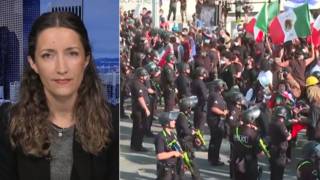
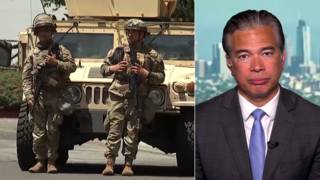
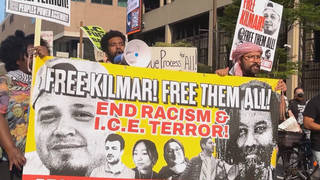
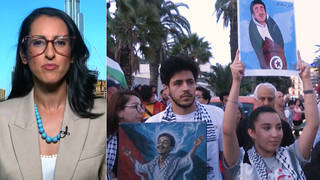
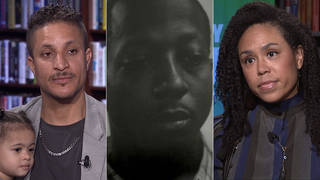
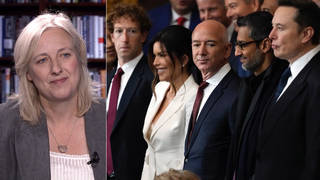

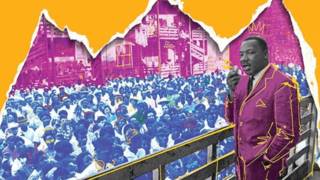




Media Options